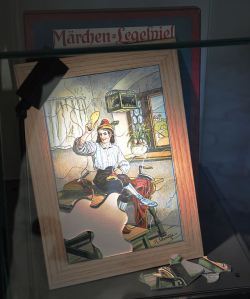Fran Macilvey's Blog, page 58
August 22, 2014
Jigsaw Puzzles
I have an aversion to repetitive tasks, and yet….there are some I can’t help but be soothed by. I know what is going to happen, I know what to do and – YAY! – I even know how to do it, without any bother.
I say I dislike jigsaws, but I suspect this has more to do with fear that I may become swallowed up by yet another obsession. I hardly need another: cards, patience, computer games, television series, films I have seen a hundred times and never tire of…I also can’t see the point in spending however many hours sorting through pieces, fitting them all together, and then, when the whole thing is done, taking the picture to pieces in a fraction of the time it took to compile it! Jigsaws are certainly not a very rational pastime, are they?
But I have been doing them, even so. It started with a very pretty five hundred piece that I found in the local toyshop, then another of the same size by the same artist, and most recently a thousand pieces that I picked up at a church fundraiser in Shetland. When a regular came round the table after me and collected several others to do on the dark winter evenings with the rest of the family, I almost offered her the one I had bought, but hung back.
Since I have a history of abandoning projects half-finished, I wanted to prove I could take on a larger puzzle and complete it.
That seemed a worthwhile thing to prove. Also, in becoming absorbed sorting and finding pieces, the mind is afforded a rest: we have to concentrate, so cannot dwell on our usual stuff, and instead I found myself thinking encouraging thoughts, singing loudly and feeling delighted when I located the exact piece I might be looking for. Hoping to solve the mystery that is the attraction of puzzles, I have concluded that they are wonderful because a single piece often looks like nothing on earth, and yet, when placed snugly with its brethren in the right place, it transforms into something meaningful. Ah, that’s what it is! Of course! The trick of the eye is amusing and instructive, in its small way.
One of the odder side-effects is seeing life with jigsaw lines running across it. I have completed the puzzle, and shall put it back in its box in a few days. Having done what I set out to do, I shall next decide whether to keep the puzzles to do again or give them all away so that I am not tempted to ‘waste any more time’ with them. Who would have thought that puzzles could raise so many existential questions?


August 20, 2014
Fresh Lemons
Inspired by a post by Maggie Wilson, The Zombies Ate My Brains
http://mcwilson1956.wordpress.com/2014/08/08/lemon-tree/
I used to suck lemons, eat their flesh eagerly, and leave just the curl of peel at the side of my serving of fish, salad, or whatever else was on offer. Others at my table would grimace, scowl Eeeeugh…How can you do that? and gingerly set their side salad to the every edge, as if frightened even to touch it. Many times, I would eat theirs too – delicious, though I would never eat a whole lemon.
Small slices of lemon are easy to eat, because our taste buds still recall the sweetness of the rest of our food. Also, fresh lemon is nothing like as bitter as that which has sat for a while. Fresh lemon is zesty, sweet and bright. Older lemons reek of dry bitterness and are increasingly unpalatable.
I feel an aphorism coming. When we suffer an injustice, feel it deeply then let it go and get on with our lives, that is better for us than when we hold on to a grievance or a sorrow. In the same way that fresh lemons are sweet, unlike those that we hang on to for too long, clutching our hurts and refusing to release them turns them more bitter as time passes.

Gaillardia grandiflora – ‘oranges and lemons’


August 18, 2014
On the bus
On a recent Friday, we took the bus into town. Usually, we take the car; but with holidays, the Festival and Fringe, the pedestrianisation of George Street and various other considerations – okay, I needed some exercise – we found ourselves tripping into town on the bus. It made a pleasant change.
I was a bit baffled at the sight of a tiny tot sitting entirely un-restrained on one of the front seats, though. Surely, buses could introduce lap-belts or something? I am supposing that the usual argument against introducing seat belts on buses is that they are impractical, and expensive to install. Little children so trustingly clamber over the seats, sit where they are put or stand up taller to gaze wonderingly out of the windows at all the new stuff outside.
I am assuming that the policy against seatbelts was first formulated when older buses followed these routes. The older vehicles had handles on the backs of seats fitted close together, making the tighter spaces somewhat easier to navigate. Going to alight from a modern, more spacious bus while it is on the move, is akin to falling through space and hoping for a place to land safely. Ideally, vulnerable passengers should sit near the front, and only start to walk to the exit when the bus is stopped, but that is rarely feasible in practice.
It is asking too much, to assume that drivers will always drive sedately, or that they will never have to stop suddenly, or swerve in a hurry to avoid something. Buckling and belting up for private car journeys is standard. So why are bus journeys treated differently? Puzzled of Edinburgh is glad that her daughter is old enough to take her own sensible precautions. She remains concerned that mothers, juggling the demands of prams, push-chairs and young children, are not getting the consideration they deserve.


August 13, 2014
What I learned about abject humiliation
Sunday was a wash-out, and Monday was little better. Few sunny rays pieced the grey clouds, and I was resigned to feeling low and thinking that I had best learn to grow old gracefully, as Autumn was clearly on the way, and there was nothing much I could do about it. Hoh hum! I felt about as grey and depressed as the dark clouds on a cold, gloomy afternoon.
Then two things happened in quick succession. First, it occurred to me that most of the feelings of humiliation with which I was beating myself up, most of the embarrassment I was experiencing about clambering up dirty stairs and asking for help to get down again, about collapsing on the pavement in the rain, falling in puddles and achingly finding a way to clamber upright….most of the embarrassment I felt about that was invented.
Of course, I get sore and bruised, and my trousers get torn and dirtied and I have to go home and change because the mud is just too heavy and wet to carry around. Of course, other people don’t have this constant, grating uncertainty, nor the obsession with staying upright and tidy, nor the worry of falling and not being able to get up again. My left hip has no power in it.
But – but – but – but – BUT STOP. None of what I believe or think they think is real. None of the feelings I have needs to be excused or explained, and, most importantly, no-one is judging me harshly, criticising me, or expressing an unhealthy interest. No-one has negative opinions about me. No-one is critical. As I said in a comment to a comment
I realise that a great many of my unhappy feelings are the result of seeing judgements – and prejudicial judgements, at that, how prejudiced of me! – which are simply not there.
I am glad that I still have feelings, and that I am not ashamed to cry, and that I leap in the air when I am happy. For saying things like, “Now, that’s enough, dear….” I scolded my husband. If I want to feel overwhelming joy, I shall feel it. If I need to feel genuine, heart wrenching sorrow, I shall do so. And no fears of what another thinks or says will stop me. Thank God I got that sorted.
Later that evening, I found this post on my WordPress feed, which turned out to be the second thing. If anyone would like to find a great video to watch, here is one with Louise Hay and many of my other heroes, which got me back on track. Thank you, Ivy Mosquito, for finding this, and posting it when you did.
https://ivymosquito.wordpress.com/2014/08/11/this-is-my-answer/


August 11, 2014
Abject humiliation, that’s my bag
Easy, get down off the boat’s slippery gangplank, only have to raise my right foot a bit higher and be careful in the rain. There we are, now, ready to start the climb up the stone steps to the island. Done this sort of thing a million times before, but usually alone, so that I can get the angle right, the exact tip needed. If I don’t quite make it first time with the foot-lift, I can have another go, while others behind me surge amicably past making friendly, reassuring noises.
Not this time. Thinking to be polite, and needing a bit of help with balance, I solicit the help of the friendly bloke clad in the regulation fluorescent jacket, on hand to offer assistance. Believing it needful, he pulls me forward, as if I am like a child and he can hoist me up. Except that, at this new angle, lifting right foot high enough to reach the step becomes impossible. I fall before I get started, and am heaved upright by two or three very willing persons. For me, an ageing, gentrified lady of fifty, the whole experience is exasperatingly familiar.
I hope you didn’t hurt yourself when you fell? Thank you, I am fine, and don’t feel in the least put out that I was effectively pulled off my feet and then raised up like a heavy lump. Being a heavy lump scarcely a consolation. I let the whole thing slide off me and disappear. Result! I have another blog post in the bag.
Except, – Oh God!- there are no handrails on either of the stairways up to the old and dignified room that remains intact amidst the general, geriatric ruination of this castle. So I stumble up and around the spiral staircase doing the landlubbers equivalent of the doggy paddle. Then all of a sudden, as if he knew exactly what I would like the most, a lovely young man appears at my side and offers, “Here, you can lean on me” and we proceed together, happily upright, me moved more than I care to admit. In the general mishmash of emotions bubbling away, it would take only a little something to start me crying. Oh, God, that is lovely music, where is my hankie? There are times when I just want someone to lean on.
Going down is the familiar story in reverse and even less dignified, filled with eddies of fear and uncertainty, while I work out what to do with my elbow crutch – it is dangerous, inflexible and in the way, so eventually I throw it down the stairs ahead of me, just to be rid of it – and then the rest is easier.
Is this yours? asks another helpful lady.
Yes, it is mine. Would you like it?

Brodowski – Portrait of a woman


August 5, 2014
Hanging it all out to dry
Writing autobiographical material is a bit of a tricksy business. We are rather beholden to tell something of the truth, though heaven knows that can be rather difficult, both to discover and to articulate. Entertainment value also supposes that we have to write something interesting, kinda, avoiding narcissism and voyeurism on the way. And, I suppose, we run the risk of offending whomever we mention in passing, if our portrayals are unkind, thoughtless or incorrect.
Writing “Trapped” is, by far, the most difficult thing I have done: relentlessly exorcising demons, re-examining every facet of life as I have lived it and understood it, and taking responsibility for many parts where I could have done better, been more kind, generous and especially, more aware of what others had to tolerate. Writing has allowed me to offer an apology, of sorts, and to meet and make up with friends and family, before it was too late. I am so glad I took that chance. I am so glad.
With hindsight, I also suspect that one reason I started writing was to demonstrate that, clearly, the world is very much kinder to me than I have hitherto been to myself. In that sense, there has never been anything to worry about. If only because publication brings friends and readers who are constantly generous, loving, thoughtful and supportive, writing has already worked wonders. I have harboured many fears – and I am sure many writers do – some of which we commit to paper, read through and then launch on an unsuspecting public amidst a sea of doubt. We fear the clamour of disapproval. Waiting fearfully for the backlash….blessed approval or silence answers.
Constantly seeking reassurance, perhaps writers habitually focus on critiques which are muted or less than stellar. We receive fulsome and genuine praise from all quarters, yet the comment we focus on is the lone voice which ‘damns with faint praise’. Many of us do this, I am sure, and I have decided to stop. Focussing too much on the critical critic is perverse, ridiculous, and completely ignores the truth that all opinions are valuable, and some have benefits that I will never notice or understand. I let it be, and write when I can.
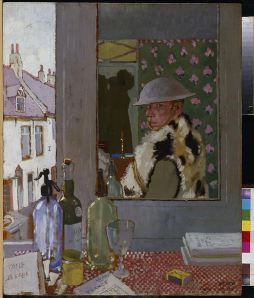
Self-portrait – Orpen


July 31, 2014
Rhona, Where’s Yer Troosers
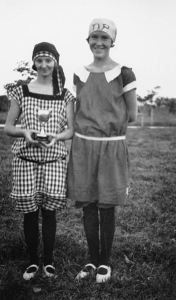
Girls c 1920
Before the holidays got into their swing, daughter and I went down to the nearest row of shops which happen to contain a school outfitters. No sooner out the school gates, than we get kitted out with new shoes, new tops and trousers for the next school year. If we are naïve enough to leave it until the end of July or – heaven forfend! – the week before school starts again – not only will we miss out on a budget enhancing 20% discount, but there will be nothing – not a thing – left for Seline to wear. Typically, the middle range/size school kit gets bought up from about the middle of June.
So we went into the outfitters. I’m such a fool, but, you see, I prefer to shop in a near my home, rather than trailing down town or shopping on-line. There are some things kids have to try on. So, battling my usual feelings of unease as I pushed the door ajar – this shop has pretentions of grandeur, catering as it does, for ‘best’ local (non-fee-paying) schools – I politely enquired about trousers in my daughter’s size.
“Trousers? We don’t stock trousers for girls.” I might have guessed. Young ladies of that ilk are expected to wear cumbersome tunics or pretty dresses with ankle socks….not trousers. Good grief, Charlie Brown. I am pleased that my daughter wears them, and so relieved she will not have to endure tights as she is growing up. If she likes them, that’s fine. But to be forced to choose between wearing them or spending ages pulling up socks at school? I thought gender stereotyping had gone out years ago….apparently not.


July 24, 2014
Bookshelves
Will bookshelves one day be consigned to museums? Written out of our furnishing requirements as interesting curios from past times, and gazed at wonderingly by precocious five year olds, the way that children now peer at old telephones and record players? There is a section in the National Museum of Scotland devoted to lifestyle icons of recent history. I’m sure I have used some of these venerable machines. Perhaps, given my age, I should just climb in and join the exhibits….
Kindles are great. But will we all be using them, all the time, in ten years? Will there be any need for shelving for books, when my kindle offers several free dictionaries as part of the start-up incentive built in with every new purchase of an e-reader?
Will house-builders have an even better excuse for building homes in miniature? (“Ye don’t need shelf space no more, love, so we can just put the standard king-size up against the wall here, like that”)
My guess is that we will always need books, and there may come a time when we are immensely grateful for the old back numbers that we now overlook, with their modest orange and white covers, and their restrained delvings into human suffering. As has been suggested in many post-apocalyptic narratives, we may need to tear out the pages to use for personal grooming or for fire-lighting; or, when the power runs out, we may actually start reading them again.
Our current technical infrastructure relies on power, generated mostly from non-renewable resources. Plastic, metal, wood, paper and water….all finite. ‘Real’ books have the potential to last for hundreds of years, and can pass through countless pairs of hands. Electronic media, in contrast, are ephemeral, here one day and deleted the next.
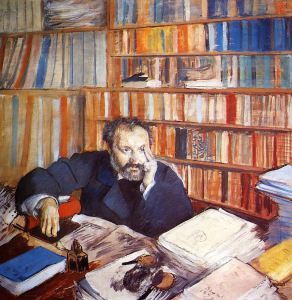
Edgar Degas Portrait of Duranty


June 27, 2014
Roads
Looking at an aerial view of a motorway complex, a flyover with numerous tributaries running in smooth lines, I am amazed at the amount of space and importance we honour them with.
I know roads are vital for transport. Rivers have served man for millennia, and natural routes across the land evolved easily. Drover tracks for men on foot, bringing the cattle overland to the lowland, urban markets, kept the pace gentle and invigorating.
What do we do in cars on roads? We go faster.
How much prime land is blanketed with concrete and tarmac, blighted by having a road cut through it? In contrast with ancient roads which politely hugged the hills and crept over inconvenient places keeping a low profile, modern roads like to be as direct as possible, driving straight through a place, no matter how destructive, divisive or ugly the end result might turn out.
Roads are vital for growth, nowhere more so than in huge continental stretches like Africa, where modern tarmac stretches are still a novelty. Transport infrastructure, when it is not being blown to smithereens by conflict, has been steadily improved, laid down since the 1980’s. But the casualties of improvement linger, bewildered, watching from the side-lines, as a road is cut through a village or township. When I was visiting Rwanda in 1981, communities were being freshly divided, friends split from their families and neighbours by a wide expanse of hard grey. Not yet understanding that playing and walking on the road in the traditional, sauntering manner was a deadly affair, fatalities were fairly commonplace.
Personally, I blame the Romans.
It is holiday time, and I shall probably not be blogging much in the next six weeks or so. I have reading and reviewing to keep me going, a bit of editing and perhaps time to write a few more pieces. Meantime, thank you so much for visiting my blog, for your generous comments and your support. Enjoy your holidays!

Spaghetti Junction


June 26, 2014
Summertime
It is past midsummer, a thought which makes me feel fully justified in leaving my seat, descending the staircase and launching myself outside into the sun. Believe it or not, I used to find that a challenge, but who can resist real beauty, just outside the back door? Real, big trees at the boundary fence, down the hill. Real sunshine on my face and wind at my cheeks. What? Summer? Already?? Well, got to catch those rays! Given our northern latitudes and the tendency for Edinburgh to be shrouded in mist for many days of the year, doing anything else would be sheer folly. If my work rate at my desk is slower than usual, I shall just have to accept that this is the way God wants it to be.
Why would God send a lovely day, just for me to ignore it? I have been mulling over a passage in A Course In Miracles,
“God established his relationship with you to make you happy, and nothing you do that does not share his purpose can be real. The purpose God ascribes to anything is its only function. Because of His reason for creating his relationship with you, the function of relationships became forever ‘to make happy.’ And nothing else….For nothing God created is apart from happiness, and nothing God created but would extend happiness as its Creator did. Whatever does not fulfil this function cannot be real.”
Which is a long and lovely way of saying, if you are unhappy, you are moving in the wrong direction. I guess this gives me permission – and a compass – so that I can be happy forever. YAY! What a feeling.
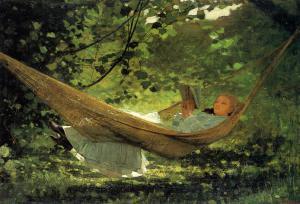
‘In The Hammock’ by Winslow Homer



